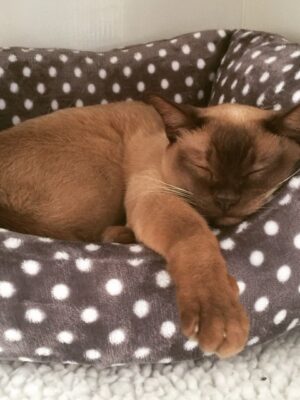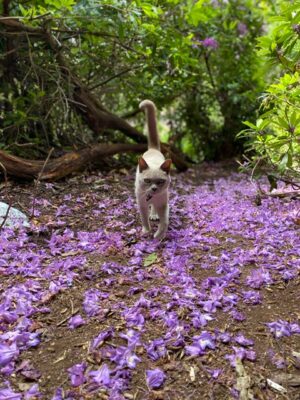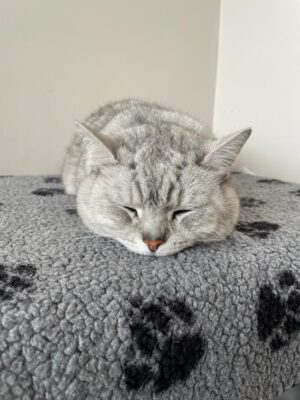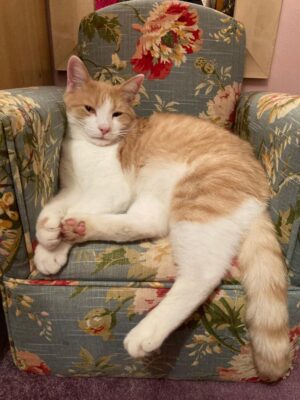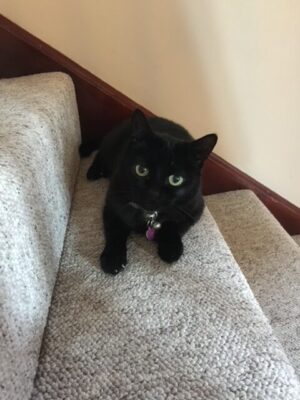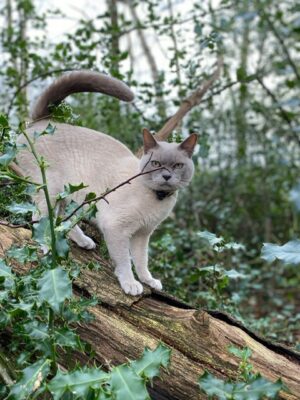Feline Lower Urinary Tract Disease
This is not a specific disease but a term to describe conditions that affect the bladder and urethra in cats.
Common symptoms include:
Painful urination, urinating in inappropriate places or more frequently, blood in the urine, inability to urinate, overgrooming and behavioural changes. If your cat is unable to urinate at all this can be very dangerous and you must notify us immediately. You may notice them licking excessively at their penis or vocalising when trying to urinate.
What causes it?
There are many different causes
- Bladder crystals or stones
- Bacterial urine infections
- Urethral plugs: build up of cellular debris within the urethra (the tube from the bladder to the outside world)
- Anatomical defects
- Growths of the bladder or urethra
- Idiopathic cystitis/stress cystitis
Where next?
In 60-70% of cases it will be idiopathic cystitis. However, we have to rule out the other causes in case these need treatment to prevent the signs from getting worse.
In first instances a urine sample can help determine what may be causing the symptoms – it can help establish whether there are urinary crystals/stones or bacterial infections. We can provide you with non-absorbent litter to obtain a urine sample, alternatively we may be able to get a sample directly from the bladder using a small needle and this is generally a painless procedure.
X-rays or ultrasound may be necessary to examine the bladder to look for stones, or lumps or bumps in the bladder or urethra. Sometimes contrast dye is placed in to the bladder to aid identification of these.
What can be done?
Treatment or management depends on the cause:
Bacterial infections – these are more common in older cats especially those with other underlying conditions particularly diabetes or kidney disease. Urinary tract infections can be treated with antibiotics but usually we will send a urine sample to the laboratory for a bacterial culture: this will tell us which bacteria is involved and ensure we have the most appropriate antibiotic to clear the infection. Sometimes a 4-6 week course of antibiotics is necessary and often repeat urine cultures during and after treatment to ensure we have managed to resolve the infection.
Urinary crystals or stones – if your pet has crystals in their urine this most likely will require a change to a special diet to reduce these forming. Crystals form in certain acidity or alkalinity of urine and by changing the diet to a specially formulated diet it can prevent these from forming. Crystals can eventually form stones which can cause irritation to the bladder and can also lead to obstruction. Some stones can be dissolved with diet, but often require surgical removal.
Urethral plugs – This is usually a build up of inflammatory material in the urethra which causes a plug and obstructs the urine from coming out. This and stone obstruction can be life threatening therefore if your cat is not urinating at all and has a ‘blocked bladder’ this must be relieved immediately. This is done by passing a urinary catheter under an anaesthetic. Once this has been relieved your cat may need to stay in hospital for a few days. After a blockage swelling and spasm of the urethra is common so pain relief is really important. Your cat may also be prescribed a special diet such as Hills c/d stress, Hills c/d or Royal Canin urinary and may recommend you feed more wet food to increase the water in take.
Feline Idiopathic Cystitis – Management of FIC is more complex, as the underlying causes are not fully understood. FIC can be caused by stress, an inappropriate stress response, neurogenic inflammation or a defective bladder lining. Therefore the mainstay of therapy is management of things such as water intake and reducing environmental stress. Some cats will require pain relief. Others may improve on bladder supplements or diet adjustments.
It is important to try and identify the cause of stress but this isn’t always possible. It could be another cat in the household (this is the most common cause) or in the neighbourhood, a change in routine or environment, not enough stimulation for indoor cats or a dislike of its environment e.g. inappropriately placed litter tray.
Some top tips for FIC:
- Lots of water bowls around the house in glass or ceramic bowls, with the water filled up to the brim (some cats don’t like their whiskers touching the edge of the bowls)
- Try a water fountain, some cats prefer to drink running water!
- The general rule is to have one litter tray per cat in the house, plus one
- Keep the litter tray clean
- Try different litter substrates as some cats prefer one substrate compared to another
- Keep food and water bowls separate from each other, and feed cats away from each other
- If you have an indoor cat, try stimulate it by playing games regularly or add some stimulating scratching posts or climbing frames
- Pheromone therapy – ‘Feliway classic’ is a diffuser that can help stressed cats! Have this plugged in at all times to help your kitty chill. If you think your cat is stressed due to another cat in the house, then ‘Feliway friends’ may also be required.
- Have lots of places for your cat to hide at home, high up places in quiet spots are ideal!
- Hills have a formulated diet called ‘Hills c/d urinary stress’ that can help stress induced FIC as it contains L-tryptophan and milk hydrolysate
- Bladder supplements such as Cystophan, Cystease and Nutracyst can be really helpful
- Zylkene is a milk protein derivative that can also reduce stress
Bladder tumour – Fortunately, bladder tumours are rare in cats. Transitional cell carcinoma is the most common tumour seen and occurs mainly in older cats. Often by the time clinical signs develop the disease is quite advanced and surgical removal of the tumour is rarely possible.
Chemotherapy may be helpful in reducing the size of the tumour and improving quality of life for the cat, and in a number of cases using non-steroidal anti-inflammatory drugs (NSAIDs) such as meloxicam appears to be very helpful. These drugs are usually very well tolerated and as well as relieving inflammation can have an anti-cancer effect in some tumours and sometimes marked improvement can be seen.




